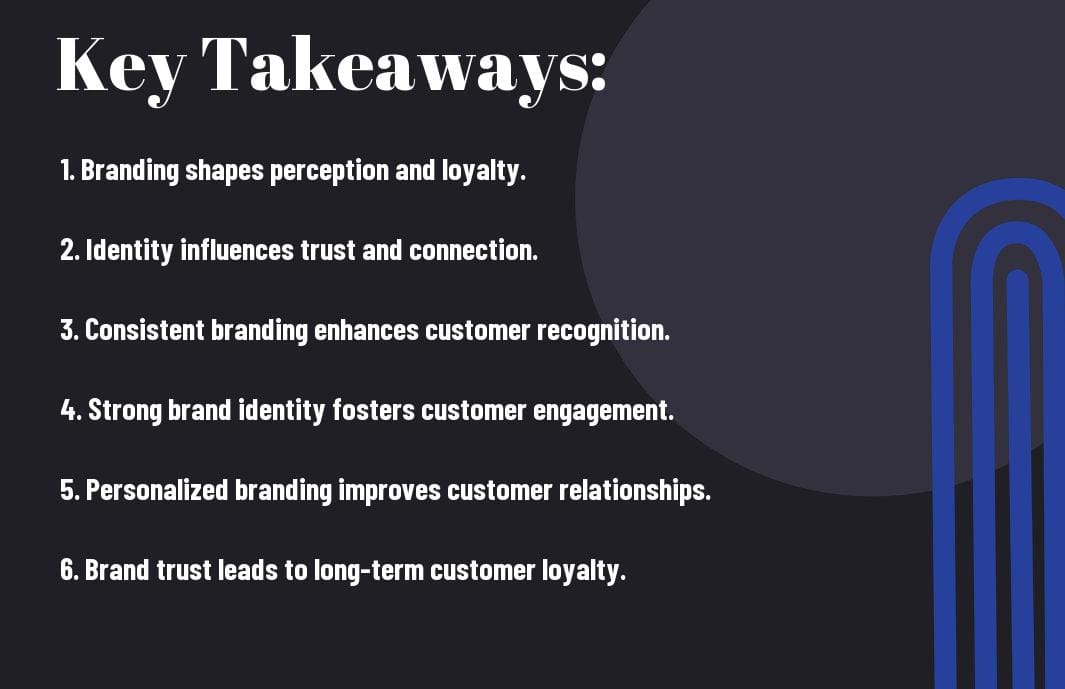Just as a business must carefully cultivate its branding and identity to stand out in a crowded marketplace, these elements also play a crucial role in customer relationship management (CRM). The way a company presents itself, its values, and its messaging all contribute to how customers perceive and interact with the brand. In this blog post, we will explore the relationship between branding and marketing and how it directly impacts CRM strategies.
Key Takeaways:
- Branding builds trust: A strong brand identity can reinforce trust and credibility with customers, making them more likely to engage and remain loyal.
- Identity reflects values: A brand’s identity should align with its core values and communicate them effectively to customers, building a deeper connection and relationship with them.
- Impact on customer loyalty: Effective branding and identity can lead to increased customer loyalty, as it helps differentiate a brand from its competitors and creates a memorable experience for customers.

Branding and Its Role in Business
Now, in the competitive world of business, branding plays a crucial role in shaping how a company is perceived by its customers. A strong brand can set a business apart from its competitors, create loyalty among customers, and drive repeat business. To probe deeper into the benefits of brand identity in enhancing customer loyalty and retention, check out this insightful article on Benefits of Brand Identity for Customer Loyalty and Retention.
The Concept of Branding
Branding encompasses the process of creating a unique name, design, symbol, and image that identifies and differentiates a product or service from others in the market. It is not just about a logo or a catchy slogan, but rather about the overall perception and reputation that a company builds over time.
Key Elements of Effective Branding
Effective branding consists of several key elements that work together to form a cohesive and compelling brand identity. These elements include consistent messaging, visual aesthetics, brand personality, and emotional connection with the target audience. By focusing on these elements, a brand can establish a strong presence in the minds of consumers and create lasting relationships with them.
The role of effective branding in business goes beyond just creating awareness; it influences how customers perceive and interact with a company. A well-defined brand identity can help build trust, foster loyalty, and drive customer retention. By consistently delivering on brand promises and values, businesses can cultivate a positive reputation and differentiate themselves in the market.
Corporate Identity and its Influence on Perception
Understanding Corporate Identity
On understanding corporate identity, companies establish a set of visual and experiential elements that represent their brand. This includes the way they present themselves through logos, colors, and design elements. Corporate identity is crucial in shaping how a company is perceived by its customers, employees, and other stakeholders.
Components of Corporate Identity
On discussing the components of corporate identity, it includes the visual aspects such as logos, typography, color schemes, and imagery that create a recognizable brand image. Additionally, it encompasses the company’s values, culture, and communication style, which help in shaping the overall brand perception and identity.
Influence of components of corporate identity can be seen in how customers perceive a company. A strong and consistent brand identity helps build trust and loyalty among customers, creating a positive image of the company. On the contrary, inconsistencies or lack of clarity in corporate identity can lead to confusion and mistrust, damaging the company’s reputation.
The Intersection of Branding, Identity, and CRM
To effectively manage customer relationships, businesses must understand the profound impact that branding and identity have on Customer Relationship Management (CRM). Branding forms the foundation of how a company is perceived by its customers, while identity cultivates long-term trust and loyalty.
How Branding Shapes Customer Perceptions
Shapes The way a brand is presented to the market directly influences how customers perceive the company. Branding encompasses not only visual elements such as logos and colors but also the messaging and values that the brand communicates. Consistency in branding builds recognition and trust, as customers come to associate the brand with certain qualities and characteristics.
Identity’s Effect on Customer Loyalty and Trust
Branding A strong brand identity fosters customer loyalty and trust. Identity goes beyond just the outward appearance of a brand; it researchs into the company’s values, culture, and mission. When customers resonate with a brand’s identity, they are more likely to become loyal advocates who trust the brand to deliver on its promises. This emotional connection can lead to long-lasting relationships that benefit both the customer and the business.
This interconnected relationship between branding, identity, and CRM highlights the importance of maintaining a strong and authentic brand presence that resonates with customers. By leveraging branding and identity effectively, businesses can create meaningful connections that drive customer loyalty, trust, and ultimately, long-term success.
Strategic Branding in Enhancing CRM
Despite the significance of customer relationship management (CRM) in today’s business landscape, many companies overlook the vital role that branding and identity play in shaping these relationships. Strategic branding not only helps distinguish a company from its competitors but also contributes to building long-lasting connections with customers.
Aligning Brand Values with Customer Expectations
Any successful CRM strategy starts with aligning a company’s brand values with the expectations of its customers. Customers are more likely to engage and remain loyal to a brand that resonates with their values and beliefs. By understanding and meeting customer expectations, companies can create a strong emotional connection that goes beyond mere transactions.
Personalization and Segment-Specific Branding Strategies
Personalization is a key component of effective CRM, as it involves tailoring products, services, and interactions to individual customer needs and preferences. Segment-specific branding strategies further enhance this personalization by targeting specific customer groups with tailored messaging and experiences.
For instance, utilizing data analytics to understand customer behavior and preferences can help companies create personalized marketing campaigns that speak directly to the needs of different customer segments. This level of personalization not only strengthens customer relationships but also increases brand loyalty and engagement.
Measuring the Impact of Branding on CRM
Customer Satisfaction and Brand Surveys
Impact: Your brand’s image plays a significant role in shaping customer satisfaction and loyalty. Conducting brand surveys to measure how customers perceive your brand can provide valuable insights into their level of satisfaction and the effectiveness of your branding efforts. These surveys can help identify areas where your brand is excelling and where improvements are needed to strengthen customer relationships.
Analyzing Customer Behavior and Brand Interactions
Impact: Your customers’ behavior and interactions with your brand can offer critical data for understanding the impact of your branding strategies on customer relationships. By analyzing key metrics such as purchase frequency, engagement levels, and feedback, you can gain a deeper understanding of how your brand influences customer behavior. This analysis can help you fine-tune your branding and marketing strategies to better align with customer preferences and expectations.
Customer: Monitoring customer interactions with your brand across various touchpoints, such as social media, website visits, and customer service interactions, can provide valuable insights into their engagement levels and satisfaction. By tracking these interactions and analyzing the data, you can identify opportunities to enhance the customer experience and strengthen your relationship with them.
Best Practices in Integrating Branding with CRM
Consistency in Brand Messaging Across all Customer Touchpoints
All successful brands understand the importance of maintaining consistent brand messaging across all customer touchpoints. Whether a customer is interacting with your brand through social media, email, in-store, or on your website, they should experience a unified brand identity. This consistency helps to build trust with customers and reinforces your brand values and promises.
Employee Brand Advocacy and its Effect on CRM
One of the most powerful ways to integrate branding with CRM is through employee brand advocacy. When employees are strong advocates for the brand, they become ambassadors who can help humanize the brand and create authentic connections with customers. This can lead to increased customer loyalty and positive word-of-mouth referrals.
Employee brand advocacy not only enhances the overall customer experience but also boosts employee morale and engagement. When employees are proud to represent the brand, they are more likely to go above and beyond to deliver exceptional service and build lasting relationships with customers.
Brand Responding to queries in 24h
Challenges and Considerations
Navigating Brand Identity Changes While Maintaining Customer Relationships
For any business, undergoing brand identity changes can be a challenging and delicate process. When navigating these changes, companies must carefully consider the impact on their customer relationships. It is imperative to communicate clearly and consistently with customers about the reasons behind the rebranding and how it will benefit them. Any misstep in this process can lead to confusion and alienation among existing customers, potentially damaging long-standing relationships.
Leveraging Technology to Sustain Brand Presence in CRM
Relationships between brands and customers are increasingly reliant on technology for communication and engagement. In Customer Relationship Management (CRM), leveraging technology is crucial for sustaining brand presence and fostering deeper connections with customers. By utilizing customer data analytics, AI-driven insights, and personalized marketing strategies, businesses can enhance their CRM efforts and build stronger brand loyalty.
Sustain: It is vital for companies to invest in robust CRM systems that can efficiently manage customer data and interactions across various touchpoints. By integrating technology seamlessly into their CRM strategies, companies can adapt to changing customer preferences and market trends, ensuring a consistent and engaging brand experience.
Summing up
From above discussion, it is evident that branding and identity play a crucial role in impacting customer relationship management. A strong brand image helps in building trust and loyalty among customers, while a clear brand identity ensures consistency in communication and customer interactions. By focusing on developing a strong brand and maintaining a clear brand identity, businesses can effectively manage their relationships with customers and ultimately drive customer satisfaction and retention.
FAQ
Q: What is branding in the context of Customer Relationship Management (CRM)?
A: Branding in CRM refers to the process of creating a distinct and memorable image of a company or product in the minds of consumers.
Q: How can branding impact Customer Relationship Management?
A: Branding plays a crucial role in CRM by influencing customer perceptions, building trust, and fostering loyalty towards the brand.
Q: What is the significance of identity in CRM?
A: Identity in CRM refers to how a company portrays itself to its customers, including its values, mission, and unique selling proposition.
Q: How does a strong brand identity contribute to effective CRM?
A: A strong brand identity helps in creating a consistent customer experience, increasing brand recognition, and differentiating the company from competitors.
Q: How can branding and identity alignment enhance customer relationships?
A: When branding and identity are aligned, customers have a clearer understanding of what the brand represents, leading to stronger emotional connections and lasting relationships.
Q: What role does personalization play in leveraging branding for CRM?
A: Personalization, based on a solid brand identity, allows companies to tailor their marketing messages and offerings to individual customer preferences, increasing engagement and loyalty.
Q: How can companies measure the impact of branding and identity on CRM?
A: Companies can measure the impact of branding and identity on CRM through metrics such as customer satisfaction levels, repeat purchases, brand awareness, and customer lifetime value.




